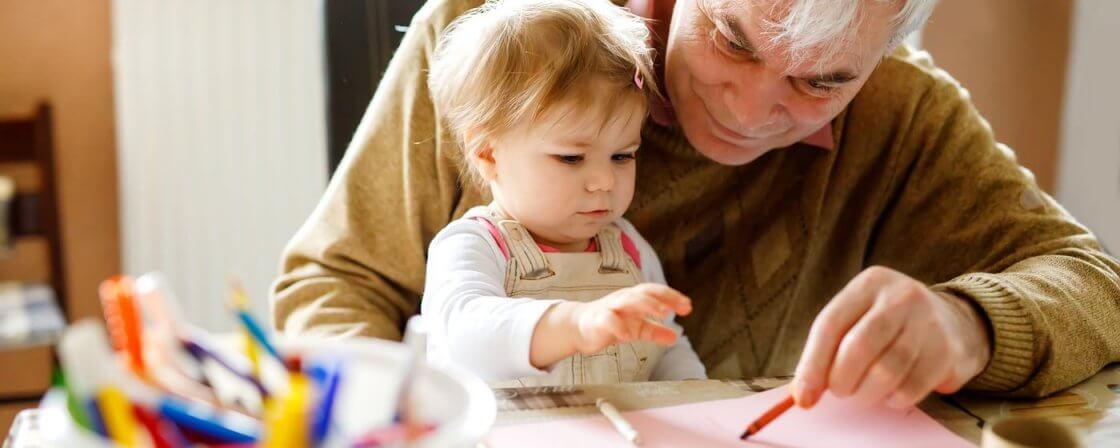Section 927 of the Civil Code states that:
“Persons related to the child, whether closely or distantly, as well as persons socially close to the child, have the right to have contact with the child, provided that the child has an emotional relationship with them which is not merely transitory and it is clear that the lack of contact with these persons would be detrimental to the child. The child shall also have the right to have contact with such persons if they consent to such contact.”
In addition to grandparents, this can be siblings or other (not only) relatives with whom the child grew up or spent a lot of time, for example.
What can I do if I am prevented from seeing my grandchild?
Ideally, the parents will agree on the child’s contact with other relatives. Some post-divorce families observe that on days when the child is with the mother, she sees her side of the family and the same applies to the father’s family. However, when an arrangement is not possible, the grandparents have the right to go to court and ask the court to order contact with the grandchild.
Are you solving a similar problem?
Do you want to fundamentally change how you interact with your grandchild?
If you are looking for advice or have already committed to legal action, it is best to contact an experienced attorney. Thanks to him, you will have a guarantee that you will not overlook what is most important for the child because of the heated emotions.
I want to take the help of an experienced attorney
- When you order, you know what you will get and how much it will cost.
- We handle everything online or in person at one of our 6 offices.
- We handle 8 out of 10 requests within 2 working days.
- We have specialists for every field of law.
What is resolved in court after a petition for modification of grandparent-grandchild contact is filed?
A grandparent who files a petition with the court to modify contact with a grandchild must prove, first of all, that there is a family connection (i.e. that he or she is the child’s grandparent), that he or she and the child have an emotional attachment to each other, and, in short, that it is in the best interests of the child to order contact.
The grandparent will also have to prove to the court that they are able to care for the child and that they will have a positive influence on the grandchild through their care. Sometimes the emotional ties between the grandparents and the grandchild are broken because the parent has prevented them from seeing the grandchild for a long time. In this case, the court will examine whether the ties can be restored.
On the practical side of things, if there is a court case, expect that the judge will want to question you and the parents, witnesses may be questioned and in some cases expert evidence may also be ordered. Depending on the age of the child, the judge should also try to get the child’s opinion on the matter.
“The negative side of the solution in court is the launching of an unpleasant machinery of witness testimonies, expert psychological opinions, and the involvement of the Department of Social Welfare. As with divorce, my advice is that a settlement is the best solution.”
Lucie Petránková, family law attorney
A grandparent also has responsibilities towards his grandchildren
So far, we have focused mainly on the rights of grandparents to have access to their grandchildren. Every grandparent should take into account that he or she also has obligations towards the grandchildren. One of the most important duties is the duty of maintenance. All ancestors and descendants have what is known as a reciprocal maintenance obligation. For grandparents, however, this obligation only comes into play when the parents are unable to provide for it. If the parents are temporarily or permanently unable to care for the child, the grandparents or other relatives are obliged to support the child. The next of kin is always the next in line to help.
If there has been a court order for grandparents to have contact with their grandchild, a number of obligations arise for the grandparents from the judgment. The grandparent should:
- pick up and return the grandchild according to set times and places,
- communicate sufficiently with the parents.
Unfortunately, if the family situation is tense and everything is resolved by the court, the agreement between the relatives is often difficult. Nevertheless, the grandparent should try to reason with the parents. For example, if a child is injured during a visit, he or she should inform them. Similarly, they should give early notice if they cannot collect the child at the appointed time. The courts will also take into account how each family member communicates and whether they happen to prevent the grandchild from seeing the grandparent.
Tip for article
Tip: Find out what the conditions for foster care are and under what circumstances you can become a foster parent or guardian.
Is a court always the most appropriate solution?
While a court judgment will often ensure that a grandparent can see his or her grandchild, it often inflames emotions in the family even more. So it is only a half-hearted victory. So sometimes it is preferable to look for alternative routes, perhaps through family mediation, and try to restore good family relations in the first place.
So what is the ideal course of action if the parents do not allow you to have contact with your grandchild?
- Try talking to the parents of the grandchild/grandchildren again and try to agree the rules of contact with them.
- If the parents refuse to communicate or do not agree to the terms you propose, you can try contacting a family counselling service. At this point, it is also a good idea to contact an attorney who can objectively analyze the situation and suggest specific solutions.
- If neither of the above solutions is helpful, it is advisable to contact the Child Welfare Office (OSPOD), where you can get more specific information on how to proceed.
- The last resort is to file a petition for modification of the grandparents’ and grandchildren’s contact with the court of competent jurisdiction.
Whether you are in a situation where you are unhappy with how your contact with your grandchild is going but are not yet sure how to proceed, or you are already in the middle of court proceedings, we are always ready to discuss the situation with you, provide legal advice and recommend the most appropriate course of action.




